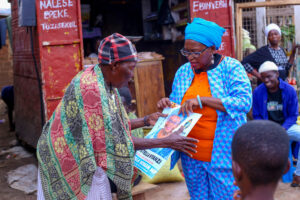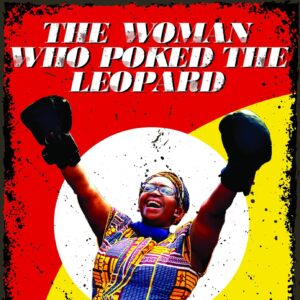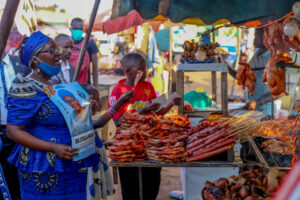Minds of the Movement
An ICNC blog on the people and power of civil resistance
by Amber French, Patience Nitumwesiga and Rosie MoteneAugust 25, 2022
“I feel like you can’t really know Stella by just seeing a few speeches that she makes. This is the warrior, the woman, the activist, the poet, the lover, this is the person I see, the woman who puts herself out there, her body, her family, everything she has, on the table, so she can see a better world.”
-Patience Nitumwesiga, Ugandan filmmaker
It’s a story of fearless resistance to dictatorship. It’s a decolonized story—one told about Ugandans, by Ugandans, not by a former colonial power. The story aspires to give back the power to Africans, and to African women and queers, in particular.

A woman of many facets. Telling Stella's story and the story of Ugandans resisting dictatorship is important to do while Stella is still alive. Credit: Matte Derrick.
It’s the story of Stella Nyanzi, a Ugandan queer woman of numerous facets, but most of all, of power through provocation. Stella, currently in her late forties, is a poetess, academic, African feminist, LGBTQIA+ activist, opposition politician, and fierce challenger of the Museveni regime. She was imprisoned in April 2017 for several weeks for posting on Facebook a poem boldly criticizing the First Lady and President Yoweri Museveni. She was arrested again in November 2018 for having published another critical poem, this time wishing Museveni’s mother’s vagina “had suffocated [Museveni] to death during birth. / Suffocated you just like you are suffocating us with oppression, suppression and repression!” People call her a crazy woman because she notoriously engaged in public nudity in protests directed at the regime.
But is she truly crazy, or has she simply found how to break the cycle of inaction and oppression, by finally getting people to pay attention to her?
It is most decidedly the latter, Patience Nitumwesiga, a Ugandan filmmaker, assures me in a recent interview. Stella’s years of “polite” protest as Mahmood Mamdani professor at the Makerere Institute of Social Research (MISR) of Makerere University, Kampala, led Stella to realize that not only Museveni but also many conservative Ugandans wanted her to be silent, or at least to act civilly. If she were to continue conforming to their wishes, the movement to bring greater justice and rights to women and LGBTQIA+ communities in Uganda would, without a doubt, fail.
Stella’s story in its own right, and as a vehicle

Credit: Film Facebook account.
Stella was right: Once she began using provocative language and public nudity—particularly shocking in Uganda’s predominantly Christian culture, a remaining vestige of the British colonial period—, she became a public figure in Ugandan society. The heavy hand of regime repression followed. In my line of work, we consider this a first sign that the regime feels threatened by a movement (although it is a very unfortunate consequence of activism).
Earlier this month, I interviewed Patience Nitumwesiga, who is directing the forthcoming vérité documentary, The Woman Who Poked the Leopard, and her co-producer, Rosie Motene, a prominent South African feminist and TV producer. In the documentary, they tell Stella’s courageous story. However, it’s not a biopic. Patience documents Ugandans’ “own journey, their own truth, and their own challenges under dictatorship” through the lens of Stella’s story.
To Stella, standing up to dictatorship is integral to fighting gender-based oppression. The root of both scourges is patriarchy—and she was ready to use all of her being, even her own unveiled female anatomy, to bring these oppressive systems down. Even if it meant that some people would call her a crazy woman.
Indeed, well-behaved women rarely make history…
Watch part 1 of our interview in which Patience and Rosie talk about how the idea of the film project emerged and has evolved.
The Woman Who Poked the Leopard
My interview with Patience and Rosie was very much a personal initiative. Since university, nearly all of the fiction I’ve read has been penned by Francophone African and Caribbean women and queers (Mariama Bâ, Leonora Miano, Djaïli Amadou Amal, Calixthe Beyala, Kettly Mars...)—many of whom identify as African feminists. Separately, having started a family in 2020, I’ve rediscovered my own feminism and power in ways I had never imagined. I realized that feminism has no boundaries and should be nourished, cross-pollinated…
When I learned of Patience’s film project, I thought an interview with her and Rosie could be an opportunity to personally connect with women in Africa, through the bridges of feminism and lived female experiences. I was not disappointed! As stated above, I learned that one lens through which African feminists understand dictatorship is that it is an embodiment of patriarchy, of violence. Thus, conversely, the very existence of women is a force of resistance, with all the benefits that come with nonviolence and nonviolent resistance: moral high ground, popular support and sympathy, inclusion and thus participation, and so on…
Yet documenting Stella’s story hasn’t come without its share of obstacles.
Watch part 2 of our interview in which Patience and Rosie describe some of the major obstacles they’ve encountered since they began filming The Woman Who Poked the Leopard.
Telling a decolonized story
Patience met Stella in 2018 at a march against femicide in Uganda. Following her incendiary poem, Stella was released from jail in February 2020, and that’s when Patience realized that her story needed to be told—and it needed to be told while Stella was still alive. From the very beginning, Patience envisioned a decolonized story, one that preserves its authenticity as African-made.
Going into the interview, I was expecting to hear that the film project aimed to further the movement for women’s rights and LGBTQI rights in Uganda. In reality, the film project constitutes nonviolent resistance in so many more ways. From our conversation, we were able to identify three levels of resistance, beyond simply underscoring nonviolent resistance in Uganda.

Stella's recent campaign for MP did not succeed, but that didn't stop her from acting and organizing for political change. Credit: Matte Derrick.
The first is documentary resistance. Stella literally embodies power against dictatorship and oppression, so documenting Stella’s life, while Stella is still alive, becomes resistance in itself. This gets to the essence of what I call documentary resistance, which is when oppressed people capture video footage, photos, written testimonies, etc. of dissidence and repression, as a form of truth-telling. It is gathering evidence to present in the great trial that is the writing of history.
The second type of resistance the film project embodies is cultural resistance, specifically to challenge colonial portrayals of Africa. Patience wished to denounce the ways Africans are often portrayed in films (most films are produced by former colonial powers like the United States, Great Britain, France…). Early on in the project, Patience turned down UK producers because they were wanting to cherry-pick from Stella’s life to tell their own story, not Stella’s story. Patience ultimately chose Rosie as a producer because she is an African feminist and was devoted to depicting Stella’s life the way it is, not the way outsiders and former colonial powers would want it to be (“Can you make Stella more African?” one UK producer had asked Patience). Telling a decolonized story meant telling highlighting the human agency of Africans, and telling an African feminist story meant showcasing the power of African women.
A third way the film project is nonviolent resistance is how it speaks out against sexism. Partners that Rosie and Patience had met were pushing the team to tell the story while including the narrative of Idi Amin, Uganda’s former brutal dictator, because he was better known internationally than Stella. The team reflected on these asks but still ignored them, because as Rosie states in our interview, women do not require comparison to men in order to be recognized.
Watch part 3 of our interview in which Patience and Rosie describe how their film project is nonviolent resistance.
-
The film shooting is temporarily on pause because of lack of funds, but they hope to raise the funds necessary to complete the project by the end of 2022.

Amber French
Amber French is Senior Editorial Advisor at ICNC, Managing Editor of the Minds of the Movement blog (est. June 2017) and Project Co-Lead of REACT (Research-in-Action) focusing on the power of activist writing. Currently based in Paris, France, she continues to develop thought leadership on civil resistance in French.
Read More
Patience Nitumwesiga
Patience Nitumwesiga is a writer, producer-director whose work emphasizes utopian and decolonized African themes while boldly confronting our current cultural and political realities. She has made short films, web series, mixed media art, and directed plays at Uganda’s National Theatre.
Read More
Rosie Motene
Rosie Motene has a BA in Dramatic Arts from Wits University. She is an independent activist, feminist writer, and award-winning author. She has excelled as a global speaker, consultant, documentary, and impact producer.
Read More